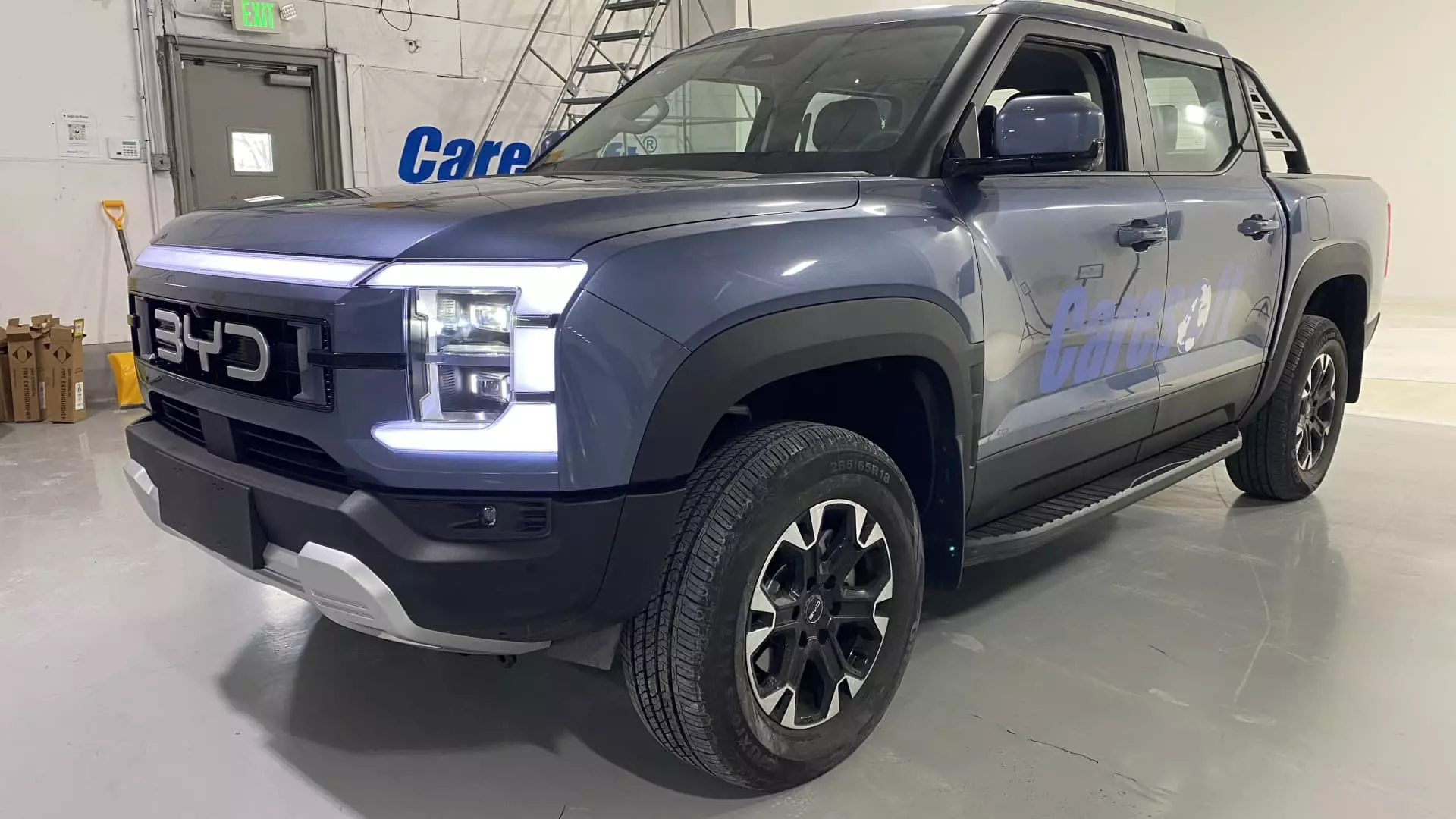In the automotive landscape, few markets are as lucrative as that of pickup trucks. For American automakers such as Ford, General Motors, and Toyota, these vehicles are not merely utilitarian; they represent an essential pillar of revenue that has shaped their histories and identities. As the demand for these muscular machines continues to flourish, a formidable contender has emerged from China; BYD Auto is set to disrupt a market that many consider their turf. Its latest offering, the BYD Shark, has garnered interest due to its unique appeal and competitive pricing amidst evolving consumer preferences.
At first glance, the BYD Shark seems to pay homage to the familiar silhouettes of American models, specifically drawing parallels to the likes of the Ford Explorer and F-150. The truck’s design blends elements that are quintessentially American with a modern flair that appeals to the contemporary consumer. While the Shark’s branding may reveal its origins, its design could easily mislead growers into believing that it hails from the U.S. itself. With BYD’s growing reputation for modern aesthetics and functionality, the Shark poses an intriguing challenge to established western brands, cranking up the intensity of global competition in a sector held dear by American carmakers.
The imminent rise of BYD and its products signals a wake-up call for traditional automotive giants. These firms are already grappling with persistent fears of Chinese imports flooding markets and aggressively undercutting pricing structures. The reality is that BYD has plans to appeal to markets recently dominated by General Motors, Ford, and Toyota, launching operations in countries such as Australia, Brazil, and Mexico. With each strategic move, the company chips away at the stronghold that these automotive giants have occupied for decades, highlighting the urgency for domestic firms to innovate, adapt, and compete vigorously.
For brands like Ford, the F-150 has stood unchallenged as the best-selling vehicle in the U.S. for nearly half a century, representing not only functionality but also consumer loyalty and brand prestige. This is echoed by Toyota’s enduring success with the Hilux, which has dominated the international market. Conversely, as the American consumer’s focus gravitates towards fuel efficiency and green technologies, automakers must adapt quickly to maintain relevance. The BYD Shark’s hybrid capability presents a compelling product that marries traditional performance with modern-day needs for sustainability—a combination that has caught the attention of industry insiders.
The surge in BYD’s exports—from a mere 56,000 units in 2022 to an estimated 350,500 in 2024—speaks volumes about the brand’s operational efficiency and market understanding. Analysts predict that BYD is now positioned to sell approximately 4.3 million vehicles globally, bolstered by its strategic entry into competitive markets and the enthusiastic reception of its latest models. BYD’s ascent isn’t merely a result of aggressive pricing; their understanding of consumer needs, coupled with technological advancements, signifies a well-rounded approach to market demands.
Despite its competitive edge, entering the U.S. pickup market will not come without challenges. During evaluations of the Shark, experts noted aspects that warrant improvement in suspension, ride quality, and overall refinement—areas where American counterparts have historically excelled. Although it delivers an engaging driving experience with rapid acceleration and a quiet cabin, there is room for BYD to enhance ride handling and interior comfort to meet the expectations of seasoned consumers who have come to expect a high standard from American pickups.
Moreover, there are aspects of the Shark that bear evident influence from its American rivals, revealing a blend of homage and originality. Recognizable features from established brands could serve as both a blueprint for success and a double-edged sword, as drawing too closely from existing designs may dilute the Shark’s unique selling proposition.
As BYD continues to innovate and penetrate new territories, traditional automakers must step back and reevaluate their strategies. The landscape of the automotive industry is undoubtedly shifting towards a more globalized model where companies cannot afford to rest on their laurels. The emergence of the BYD Shark is a poignant reminder that the future of pickup trucks will likely be dictated by a blend of innovation, competitive pricing, and an acute understanding of evolving consumer preferences. In the end, this competition may very well enhance the offerings available to consumers, benefitting the industry as a whole.
BYD is swiftly etching its name in the annals of automotive competition, making the stakes higher for established brands. As we draw nearer to a more integrated and competitive global marketplace, the dynamics of consumer choice will ultimately shape the evolution of pickup trucks in the years to come.

